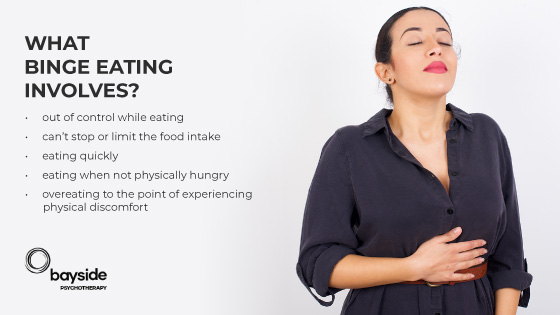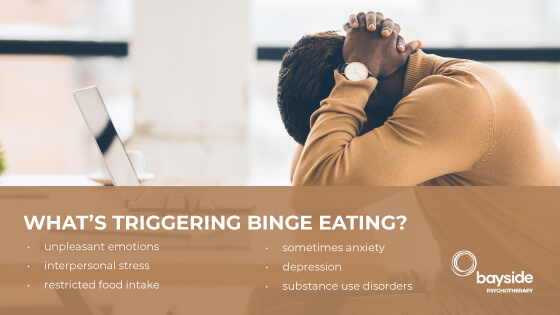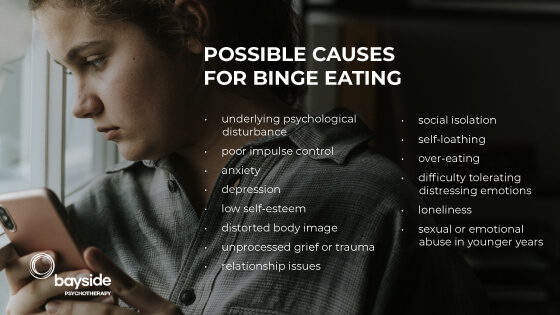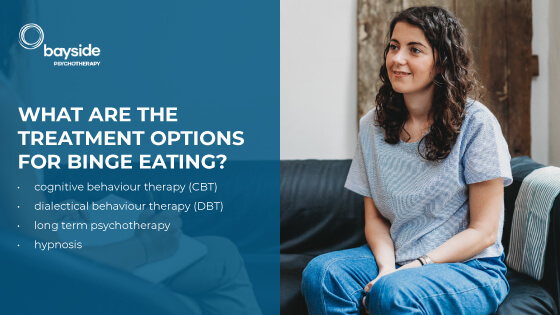Frequently Asked Questions – Binge Eating Treatment
Do I Have a Binge Eating Disorder?
Don’t wait—contact us today by calling (03) 9557 9113 or using our contact form. We’re here to help you find the support you need. Or book now if you are ready to begin: .
If you think you have a binge eating problem, contact us today by calling 03) 9557 9113 or using our contact form to inquire.
What Are The Symptoms Of Binge Eating Disorder?
The symptoms of Binge Eating Disorder (BED) often arise from deep-seated emotional and psychological struggles. These may include poor impulse control, anxiety, depression, low self-esteem, and a distorted body image. Unresolved grief, trauma, and feelings of loneliness or isolation are also common. Physically, BED can lead to digestive issues, joint pain, fatigue, and other health problems, all of which can reinforce feelings of shame and self-hatred.
If you recognise these symptoms in yourself—whether it’s the constant guilt after eating or the physical discomfort and emotional pain—consider reaching out for binge eating disorder therapy. Our therapy can address both the psychological roots and physical consequences of BED, helping you find relief and recovery.
Associated problems can include digestive complaints, guilt, shame, joint pain and degeneration, self-hatred, fatigue, depression and more. Eating problems are also common in individuals who experienced sexual or emotional abuse in their younger years.
Can Binge Eating Be Dangerous?
Binge eating can create a dangerous cycle where the desire to control weight leads to restrictive dieting, which then triggers more intense binge eating episodes. This cycle not only increases physical health risks, such as significant weight gain and related issues, but also exacerbates feelings of shame, guilt, and self-loathing, which can deepen depression and anxiety. Binge eating isn’t just about food—it’s an illness that can take over your life, making you feel out of control and isolated. Approximately 3.5% of adult women and 2% of adult men suffer from binge eating disorders, so you’re not alone in this struggle. Unfortunately, many people hide their behaviour out of embarrassment, which can lead to untreated emotional issues and further isolation..
When people binge eat, their actions are beyond their control, and it is very much an actual illness. Approximately 3.5% of adult women and 2% of adult men suffer from binge eating disorders.
Binge eaters tend to hide their behaviour from family members and friends because they feel ashamed and embarrassed about what they do when they’re in a state of binging. This can lead to emotional problems if left untreated.
What Options are there for Binge Eating Disorder Treatment?
Treating Binge Eating Disorder (BED) effectively often involves therapies tailored to your specific needs. Cognitive Behavioural Therapy (CBT) is a common approach that helps you understand the connections between your thoughts, feelings, and actions, particularly how they contribute to your binge eating cycle. Dialectical Behaviour Therapy (DBT) focuses on mindfulness and developing skills to manage distress, regulate emotions, and improve your relationships.
For those looking to explore deeper, long-term psychotherapy might be the right path, especially if you’ve already tried other methods. In some cases, more severe or persistent BED may require medical or inpatient treatment.
We’re here to guide you through your options and find the best fit for your recovery. Call us on (03) 9557 9113 or use our contact form to start your confidential therapy journey.
In addition to therapy, some self-help resources may complement your therapy sessions.
Binge eating therapy sessions can be conducted securely online by video conferencing software, and can easily be booked online.
There’s also the option to come into our Highett clinic for your appointment.
Note: This information is informative only and is not to be used for diagnosis or substitution of appropriate assessment and/or treatment by a registered practitioner. Information on this page and our entire site should not be construed as implying that our therapists are specialists in treating any condition whatsoever. While some of our therapists may have experience working with people suffering from a specific condition, not all of our therapists do. We do not guarantee any particular level of performance, cure or management of symptoms. Each case is unique and responds differently with collaboration between client and therapist being crucial. Always seek appropriate assessment from a qualified professional such as a GP, psychiatrist, clinical psychologist or social worker especially if you are acutely distressed.
Here are a couple of blogs written on this topic you might find useful:
7 Tips To Break Away From Binge Eating
How to stop eating junk food
Help Choosing Therapy:
Choose a therapist
Availability & Bookings:














